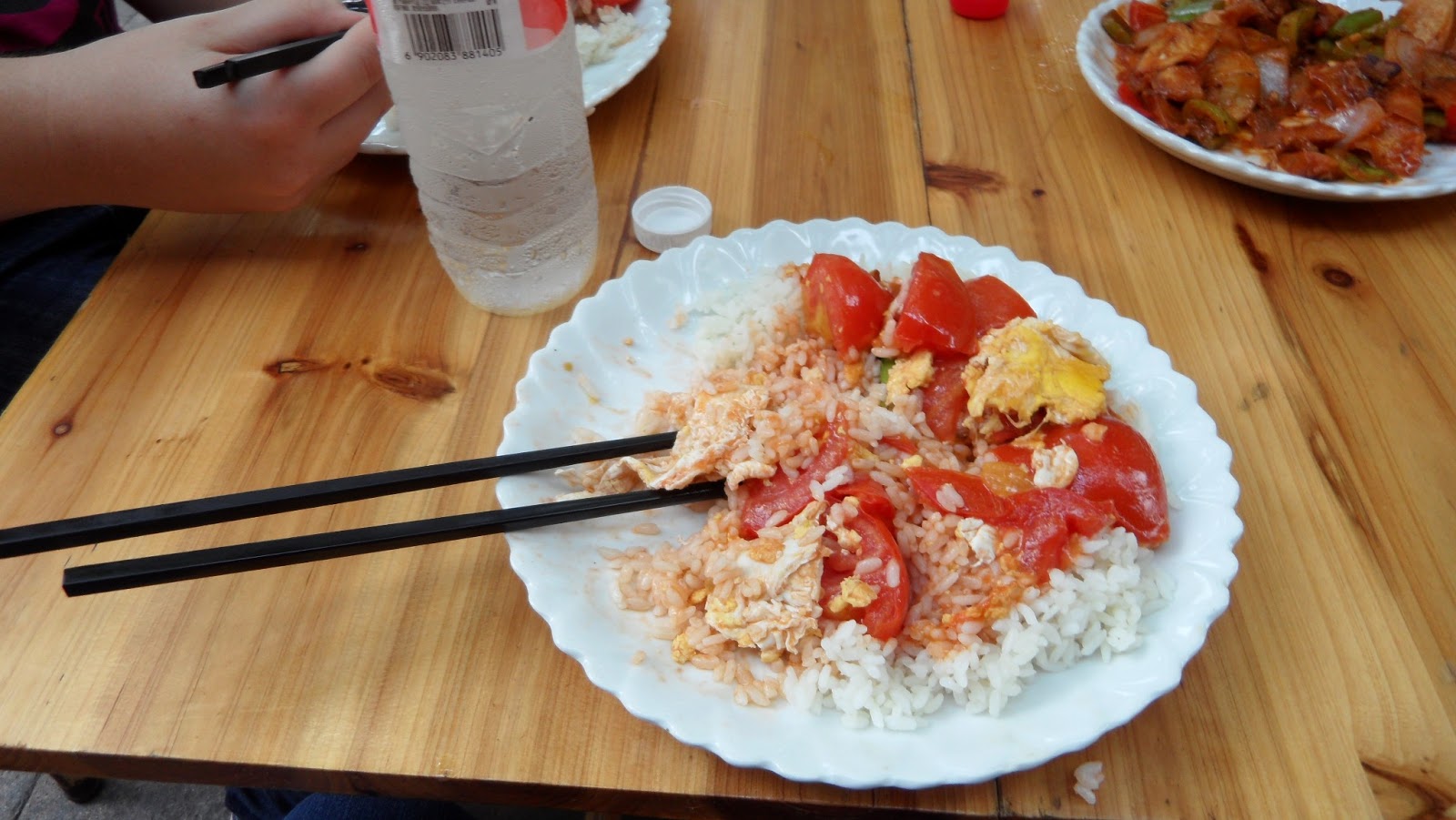So I am taking another brief respite from the educational stuff (mostly because my next post is about some of the mistakes I made as a beginning teacher and as a teacher new to EFL, and I am not quite ready to finish with that retrospection). Instead, I am going to talk about the subject that I get asked about a lot by Americans: food. "But Rachel", they ask, "what did you eat?" Honestly, I could probably fill an entire blog with just food from the past year and a half, but I will try to give you a picture with just one entry.
Personally, I like it when people ask about food, because it does show that American's do realize, on some level, that the Chinese take out they get is not authentic Chinese food. As a matter of fact, I am not even really sure where the Chinese takeout available in most areas of America comes from, because it tastes nothing like anything I ate in China. I have heard a few theories, though. One is that the food that is served in America more closely resembles Cantonese food (from Southern China and Hong Kong). And that the majority of Chinese Americans in America are from this region. Some say that in addition to originating from a small part of China, it has also been reshaped over the years in order to better appeal to American customers. Whatever the reason is, I did not come across anything resembling American Chinese food when I was in China.
 |
| Me at a Dunkin Donuts in Xi'an. We spotted it from a bus and I just started screaming. |
My first meal ever in China was actually at Burger King, right after I got off the zillion hour flight from Detroit to Shanghai. Because yes, they do have Burger King...and McDonalds (that one I learned to say in Chinese; those of you who know me know how much I effing love their french fries), Dunkin Donuts, Pizza Hut, Starbucks, Subway, Dairy Queen, Papa Johns...and even a Cold Stone or two. And especially KFC (this restaurant is
everywhere in China). In many of the larger cities, especially on the east coast, you can find your staple fast food chains. And of course there were also numerous independently owned restaurants, by foreigners or by Chinese who had lived abroad, that served western dishes (some better than others). However, depending on the size and location of the city you are in, these restaurants might not be very common. If you are way out west, you might have to take trains to visit some of these places. However, Hangzhou is a city rife with international business and tourism; in short, it has these restaurants, and we could access them easily through buses, taxis, or walking.
 |
| Burger King: Hangzhou! |
Now, having stated that these restaurants are available, let me also say that we did not eat at any of these frequently. We would go as a treat or when we were really craving something that tasted like home. We did not frequent these establishments for a couple of reasons. One, since they are western restaurants, the food was three to four times the price of Chinese restaurants and we were being paid a Chinese salary. At most of the Chinese restaurants, your average cost of food was somewhere between 2.00 to 7:00 USD (and 7.00 is on the pricey side...). Two, these are fast food restaurants, and while they were good for a cheese fix when you really needed it, the food is not that great for you, and does not compare to authentic American food (whatever your Mama cooks for you at home). Three, with the exception of KFC and Pizza Hut, none of the western restaurants were really in walking distance from our apartment, and we did not always feel like taking a bus or taxi just to pay for overpriced fast food. And the fourth and
most important reason is: Chinese food is really, really freaking good. I loved everything I ate there, with very few exceptions (sorry, guys, I just can't handle stinky tofu or chicken feet).
So what did we eat? I'm not going to lie, we ate a lot of rice and noodles. One of our favorite places was the Lanzhou Noodle restaurants, two of which were very closed to where we lived. Lanzhou food belongs to a Muslim minority group in China, and its very tasty. We frequently ate lunch there, my favorite being a scrambled egg and tomato over rice dish (you could also get it over noodles). Another favorite was something called Da Pan Ji, or Big Plate Chicken.
 |
| Big Plate Chicken. Inside is a whole chicken (head and feet included) along with noodles, potatoes, cabbage, vegetable, carrots, onions, and assorted seasoning. |
 |
| Egg and tomato over rice. In the distance is potato, beef, and peppers over rice. Some staple Lanzhou food. |
There were several Korean restaurants within walking distance, and we would frequent those places often. We also went to a Japanese chain restaurant by the name of Ajisans, because it was in the same building where we worked out. Again, we at something over rice or with noodles. Usually a form of chicken or pork with veggies. My favorite was these thinly sliced pieces of marinated beef and onions over rice. Another favorite at Ajisans was a dish featuring noodles, veggies, and a ton of clams. And all along many of the streets near our apartments were several small restaurants (really small, like four tables and the kitchen in the space of a dorm room small). During the summer, when we more prone to walking because it was warm, Liv and I would pick a direction until we came across a little restaurant with a picture menu (we knew how to order some dishes, but those dishes got monotonous, so we would order new ones by pointing at picture menus). We would typically order some kind of vegetable dish consisting of sauteed cabbage, a vegetable simply called 'vegetable', or mushrooms. The veggies were always cooked (there is no salad in China, because raw veggies are almost never eaten) with spices and seasoning. Some kind of meat dish (usually chicken or pork), and the third dish we would always try and get something new or maybe a little frightening (because we had no idea what it was). And of course, this was always served with a dish of rice, because a meal is not complete without rice.
Another interesting place we ate at was something called Hot Pot, which is very popular throughout China. It is kind of like fondue, but instead of hot oil or cheese, you simply use boiling water. So, when you order, you choose a flavor for the broth; something spicy or mild, depending on preferences. You then order a bunch veggies, mushrooms, thinly sliced beef, shrimp, clams, muscles, meatballs, quail eggs, turtle bits, frog; whatever you want, as exotic or as tame as you wish. When your water is boiling, you dump all of the stuff in the water, wait for it to cook, and then fish it back out again.
 |
| Hot Pot in Beijing! |
I didn't know what to expect when it came to food when I traveled to China. I wasn't too concerned because it is rare for me to come across food that I do not like; I was sure I would be able to find something. However, I did not expect to love it to the extent that I did. I am not saying I did not miss American food, ask my students or my fellow teachers; when it got to be near the end of my time in China, all I could talk about was going home and eating American food. And there are some foods that I ate while in China that I am 100% okay never eating again. But overall my food experience there was amazing, and if any of you are planning on traveling to China, I highly recommend diving right into the food, no reservations. I would also recommend bringing some Imodium with you... especially if you are going to dive into the street food. But its all worth it.
Oh, and this one time I ate scorpion.
And here is a slideshow of the more everyday food that I ate in China. It's all pretty wonderful (though, I probably ate my last scorpion).


































